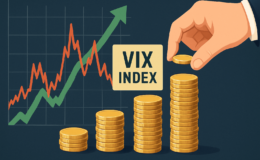If you are like me what you find out when you reach financial freedom, usually through living frugally and earning as much as possible, is that there is no way in the world you are going to pay five times as much for first class tickets. After a life time of bargain hunting you can’t turn that off, you might upgrade to premium economy or possibly business class, maybe, but no way you are suddenly going to completely blow money on first class tickets. I’m telling you, I could buy a private plane if I wanted to but I still can’t swallow the cost of first class tickets unless there is a hack involved.
How He Achieved Financial Freedom by Smart Investing
- By : ALawson
- Category : Financial Planning, Investing
- Tags: Financial Freedom, Guest Post

The term Financial Freedom is often used interchangeably with Financial Independence. But to me, there’s a subtle difference– Financial Freedom is a step higher than being financially independent. That’s when you can splurge on first-class airline tickets as opposed to traveling in coach, where strangers might end-up snoring on your shoulders, for example. But that’s just me, let’s hear it from someone else’s perspective.
The following is a guest post from Alex Lawson, a Financial Team Leader and a blogger, working together with other experts at Brighter Finance, a company based in Sydney, Australia. Whenever not working on another project or helping customers with their financial issues, Alex may usually be found online, reading money-related blogs and sharing his tips with other experts.
Being financially free is not just about being financially prepared for emergencies. Financial freedom isn’t even about being fabulously rich and living a lavish lifestyle. It doesn’t necessarily mean that you never have to work for money ever again. It’s all about being worry-free that whatever circumstances come your way, good or bad, – you can confidently deal with those in terms of finances.
While most might think that being financially free means being debt-free and having a considerable amount of readily-available funds in bank accounts, it’s actually more than that. Financial freedom involves managing your finances well; eliminating debt, having savings, and yes – investing smartly. Financial freedom also results in you earning passively – making your money “work for you” instead of you having to “work for money.”
So, here’s my story. Here are four steps on how I achieved financial freedom by smart investing.
Step 1: Eliminate debt
This may be the very first step but is the most difficult to achieve for most. Without eliminating debt, you won’t be able to go to any of the next steps. And believe me, debt can be crippling. More importantly, though, this crucial first step involves a lot of discipline. You need to manage your finances well and know where each dollar goes. This is the part where you choose between the ever-cliché ‘needs versus wants’ dilemma.
What I did was make sure that knew where each dollar went by keeping my receipts and taking note of every purchase. It was also during this time that I became quite a ‘Spartan’ – only buying what I need and downgrading my lifestyle to the barest minimum. I religiously followed the golden rule – “If you can’t pay for it in cash, you can’t afford it.”
For example, I got an inexpensive second-hand sedan instead of a shiny, new SUV. I also bought unbranded products and avoided eating out as much as I can. More importantly, though, everything else that’s left-over from my paycheck went straight to paying off my credit card. It took me about three years to finally get out of debt.
Step 2: Save up and invest, both short-term and long-term
Once you’ve finally clawed your way up from the depths of debt, it’s now time to save up and invest for both short-term and long-term needs. With debt out of the way and you still living a ‘bare necessities’ lifestyle, you should be able to have some money to spare. Now, don’t go spending it on luxury items. Like what I said, the road to financial freedom involves discipline – tons and tons of it.
This step is a lifelong process, especially for long-term investments. For short-term investments like emergency funds, you can set-up a bank account that you can automatically transfer money to every month. Ideally, your emergency savings should have about three to four months of your monthly income. This is to cover emergencies like sudden unemployment/hospitalization or unforeseen expenses like car or house repairs.
For your long-term investments, you can seek advice from a financial advisor on how to best deal with your retirement funds. Moreover, long-term investments also mean mutual funds, stocks, and bonds so it will be best to also seek advice from your financial advisor on how to go about these. You want to be saving and earning money, not losing it.
It took me about two years to finally get around three month’s worth of salary in a bank account. Furthermore, until today, I am still investing in different stock options, mutual funds, and bonds through my financial agent.
Step 3: Invest in yourself
Investing in yourself is one of the smartest moves that you could ever make. Once you are out of debt and have both short-term savings and long-term investments in place, you will have renewed confidence not only in your finances but also in yourself. Now is the time to ‘level up’ and ‘know your worth.’
You can actually do this step side-by-side with the second one – if your income would allow. Want to move up in your career? Go ahead and take that master’s degree. How about your dream business? You can already plant the seeds and start investing and growing your own small business.
If cars and houses have insurance, how about getting yourself insured too? Getting a life insurance policy and medical insurance is an example of a great self-investment. Medical insurance covers expenses due to sickness. Life insurance, on the other hand, makes sure that your beneficiaries are also protected. To add, there are also policies that mature over time and have a cash component.
If you can pay about a hundred dollars monthly for your mobile, internet, and any other subscriptions, then you can definitely afford life and medical insurance. I scrimped on these subscriptions, and once again made everything bare-bones minimum. This freed up about a hundred dollars monthly on my budget and used this money to pay for insurance.
Step 4: Invest in income-generating assets
Now, this step is where most people aspire to be. And this is definitely where you get to make your ‘money work’ for you. Aside from being debt-free, having short and long-term investments, and getting yourself protected, it’s now time to make your assets work for you.
First of all, your home should be a part of your asset investment. However, one of the most common mistakes people make is they tend to get a home mortgage the very moment that they can. While this may seem no problem, it does get complicated when you try to pay off debts while trying to keep up with monthly amortizations. Paying off your mortgage is one huge milestone for your way to financial freedom; so, make sure to prioritize it.
When it comes to rental properties avoid acquiring these until your house is fully paid for. More importantly, you should only invest in real estate rentals if you can afford to pay cash for the property and if you’re willing to go through the hassles of the rental process.
There are also other ways to invest in income-generating assets if real estate isn’t your cup of tea. You can set up a business and have someone else run it. You can also buy an existing online business or even do peer-to-peer lending through online service providers.
Related: PFGeeks’ Ultimate Guide to Building Residual Income
Conclusion
These four steps to being financially free are not get-rich-quick strategies. As you can see, it took me quite some time – almost a decade – just to get to step four. So, it will always be better if you can start these as early as you can. And oh – just to make it clear – financial freedom doesn’t equate to you being ‘free’ of the responsibility of handling your money. Actually, it’s more of you being more active in deciding where each dollar you earn will go. And once you have a complete command of your finances through hard work, sacrifice, and time, you’ll find that all your efforts will be worth it!



